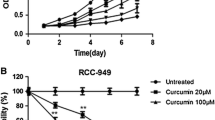Abstract
Objective: To study the growth-inhibitory effects of curcumin on B-NHL cell line Raji cells in vitro and its molecular mechanisms. Methods: The growth inhibition rates of Raji cells, after being treated with 6.25 µmol/L ∼ 50 µmol/L curcumin for 12 h ∼ 48 h, were examined by MTT assay. The apoptosis rate was detected by flow cytometry (FCM), the protein expression levels of bcl-2 and p53 in Raji cells were examined by SP immunohistochemistry. The expression of p53 in Raji cell were checked by RT-PCR. Results: After being treated by various concentrations of curcumin, the growth of Raji cells was inhibited significantly. The rates of apoptosis were 11.8%∼79.7% (P<0.01), the down regulation of p53 expression was observed within 24 h after the treatment of curcumin by RT-PCR. The expression of bcl-2 and p53 was decreased, which depended on the action time. Conclusion: Curcumin could significantly inhibit the growth of Raji cells. The induction of apoptosis by down-regulating the expression of bcl-2 and p53 was probably one of its molecular mechanisms.
Similar content being viewed by others
References
Xu JH, Chen YZ, Huang XW, et al. Curcumin inducing apoptosis and inhibiting expressing of P210bcr/abl protein in human chronic myelogenous leukemia K562 cells [J]. FASEB J 2000; 14:A1516–9.
Shi Wen Long, Liu Yan. Effect of curcumin on anticancer [J]. Chin Pharm J 2004; 3:164–7.
Jiang MC, Yang HF, Yen JJ, et al. Curcumin induces apoptosis immortalized NIH 3T3 and malignant cancer cells lines [J]. Nutr Cancer 1996; 26:111–20.
Aggarwal BB, Kumar A, Bharti AC. Anticancer potential of curcumin: preclinical and clinical studies [J]. Anticancer Res 2003; 23:363–8.
Li JK, Lin Shia SY. Mechanisms of cancer chemoprevention by curcumin [J]. Proc Natl Sci Counc Repub China B 2001; 25:59–66.
Mukhopadhyay A, Bueso Ramos C, Chatterjee D, et al. Curcumin downregulates cell survival mechanisms in human prostate cancer cell lines [J]. Oncogene 2001; 20:7597–609.
Ramachandran C, You W. Differential sensitivity of human mammary epithelial and breast carcinoma cell lines to curcumin [J]. Breast Cancer Res Treat 1999; 54:269–78.
Anto RJ, Mukhopadhyay A, Denning K, et al. Curcumin (diferuloylmethane) induces apoptosis through activation of caspase-8, BID cleavage and cytochrome C release: its suppression by ectopic expressing of Bcl-2 and Bcl-xl [J]. Carcunogenesis 2002; 23:143–50.
Gu W, Roeder RG. Activation of p53 sequence-specific DNA bind by acetylation of the p53 C-terminal domain [J]. Cell 1997; 90:595–606.
Choudhuri T, Pal S, Agwarwal ML, et al. Curcumin induces apoptosis in human breast cancer cells through p53 dependent Bax induction [J]. FEBS Lett 2002; 512:334–40.
Author information
Authors and Affiliations
Corresponding author
Additional information
Foundation item: This work was supported by the National Natural Science Foundation of China (No. 30271672).
Biography: CHEN Yan (1952–), male, doctor of medicine, professor, Tongji Medical College, worked at Essen University Medical College, Germany in 1992∼1994, and FMI Institute, Basel, Switzerland in 1999∼2000, as a visiting scholar, majors in hematology.
Rights and permissions
About this article
Cite this article
Chen, Y., Wu, Q. & Li, Xg. Growth-inhibitory effects of curcumin on Raji cells and its mechanisms. Chin. J. Cancer Res. 17, 203–206 (2005). https://doi.org/10.1007/s11670-005-0041-2
Received:
Accepted:
Issue Date:
DOI: https://doi.org/10.1007/s11670-005-0041-2




